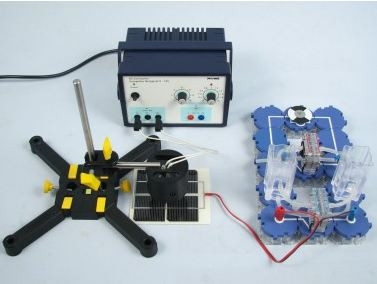Principle
Whereas coal, natural gas and crude oil sources will be exhausted in the not too distant future, the sun is expected to continue to exist in the form known to us for about 5 billion years. Solar energy can be utilised, but is not always available when it is needed. It must therefore be stored for utilisation of it around the clock. Hydrogen could be the future solution for the storage problem. The excess energy of the sun can be used to separate water into hydrogen and oxygen, which enables the energy to be stored in pressure tanks, cryogenic tanks or metal hydrides. When this energy is required, at night, for example, a fuel cell can be used to convert the hydrogen back to electric energy and water. This process functions without any hazardous waste products that would pollute the environment. Solar cells are mostly used to make solar energy utilisable in the first place. They usually consist of doped silicon. A voltage is induced in them by the photoelectric effect, so that a great light intensity results in a high performance to the electrolyzer. This leads in turn to a greater gas production.
Benefits
- Experiment is part of a complete solution set with a total of 10 experiments for Renewable Energy fuel-cell technology
- The power supply used is versatile and is particularly suitable for pupil tests for all ages
- Doubled learning success: Electric circuit diagram on top, real components can be seen at the bottom
Tasks
Can the hydrogen system also be operated by light?
A halogen lamp is used to irradiate a solar battery to determine if this energy is sufficient to drive the hydrogen system and so also the motor.


